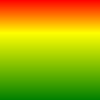 |
Qt 4.8
|
 |
Qt 4.8
|
The Gradient item defines a gradient fill. More...
The Gradient item defines a gradient fill.
A gradient is defined by two or more colors, which will be blended seamlessly.
The colors are specified as a set of GradientStop child items, each of which defines a position on the gradient from 0.0 to 1.0 and a color. The position of each GradientStop is defined by setting its GradientStop::position property; its color is defined using its GradientStop::color property.
A gradient without any gradient stops is rendered as a solid white fill.
Note that this item is not a visual representation of a gradient. To display a gradient, use a visual element (like Rectangle ) which supports the use of gradients.
{class="float-right"}

The following example declares a Rectangle item with a gradient starting with red, blending to yellow at one third of the height of the rectangle, and ending with green:
Calculating gradients can be computationally expensive compared to the use of solid color fills or images. Consider using gradients for static items in a user interface.
In Qt 4.7, only vertical, linear gradients can be applied to items. If you need to apply different orientations of gradients, a combination of rotation and clipping will need to be applied to the relevant items. This can introduce additional performance requirements for your application.
The use of animations involving gradient stops may not give the desired result. An alternative way to animate gradients is to use pre-generated images or SVG drawings containing gradients.